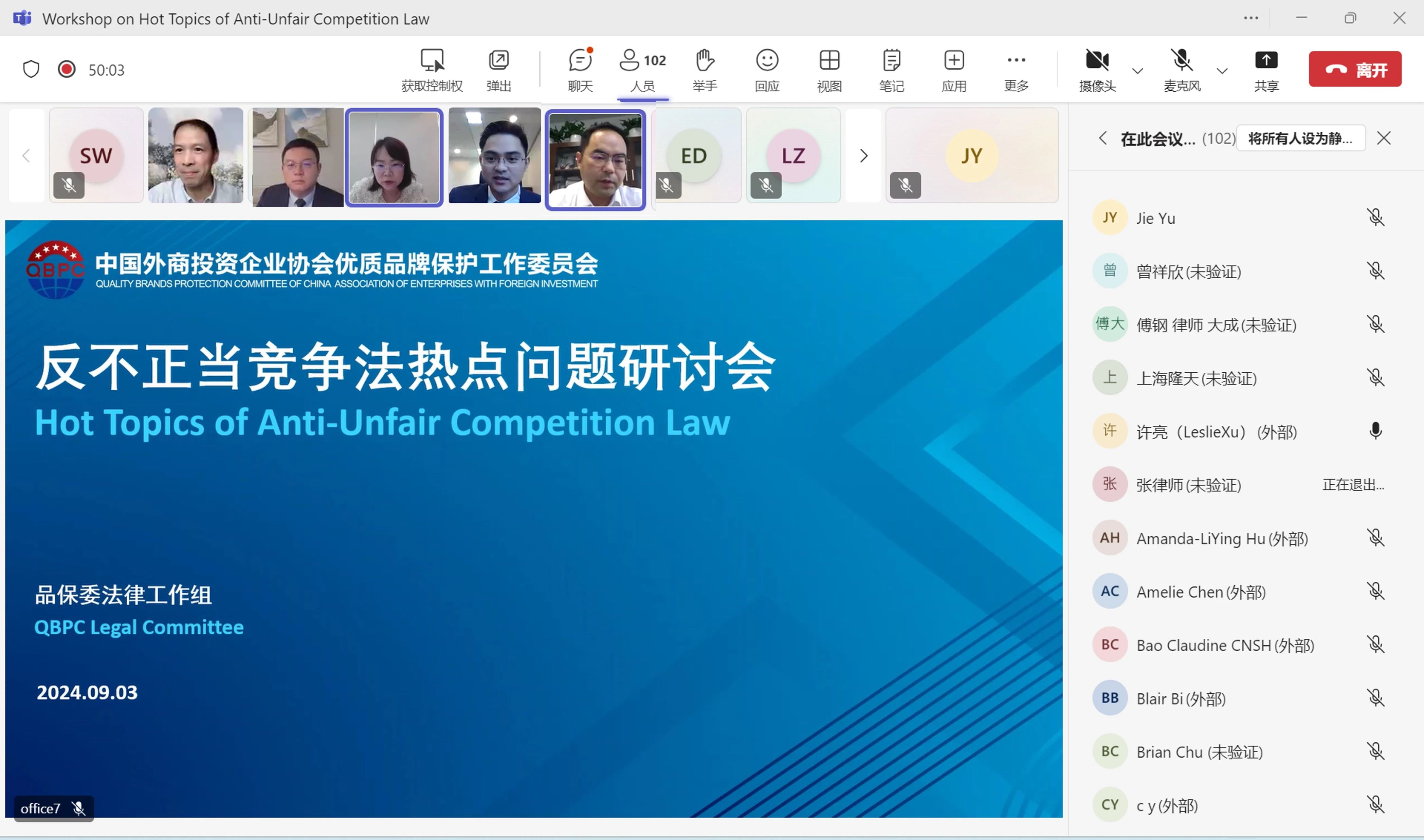On September 3, the QBPC Legal Committee held an online seminar on hot topics of the Anti-Unfair Competition Law. The seminar included two panels, one on the topical problems of anti-unfair competition on the internet and the other on the unfair competition concerns over malicious trademark squatting, with lawyers Liang XU, Ling CHENG, and Xiaobing WANG providing detailed explanations. QBPC Legal Committee Vice Chair Xi CHEN and SHBA Intellectual Property Practice Research Committee Secretary General Gang FU hosted the seminar, and more than 100 QBPC members attended.

First, XU gave a detailed explanation of the recently implemented Interim Provisions on Anti-Unfair Competition on the Internet. He outlined the Provisions’ macro and practical background, positioning, and significance while emphasizing that, as the first departmental rules on competition rules in the Internet field, the Provisions followed the trend of the new round of amendments to the Anti-Unfair Competition Law and had important guiding and practical value. Next, XU provided an overview of the Provisions, including general requirements, specific network unfair competition behaviors, platform responsibility, law enforcement and case handling procedures, legal responsibility, and so on. He also analyzed hot topics such as “placing false purchase orders and manipulating credit ratings,” “Praise Cashback,” and other new types of unfair competitive behavior. Then, based on the hot scenarios of unfair competition specified in the provision and typical judicial cases, he shared the basic adjudication standards, judicial response principles, and specific protection of data rights and interests in network unfair competition cases. Finally, XU advised QBPC members on how to defend their rights and ensure compliance following the implementation of the new Provisions.
Ling CHENG presented her analysis of jurisdiction in network anti-unfair competition cases. She noted that the rapid growth of the internet had resulted in increasingly serious behavior of unfair competition on the internet, posting significant challenges to judicial practice. She elaborated on the evolution of laws and regulations governing unfair competition on the internet, including the revision of the Anti-Unfair Competition Law and the addition of new “Internet Specific Provisions," as well as the Interim Provisions on Anti-Unfair Competition on the Internet, which provided robust legal support for the fight against unfair competition on the internet. She also listed new types of unfair competition on the internet and explained the legal application and jurisdiction of these behavior through case study. Meanwhile, she discussed the adjustments of jurisdiction in administrative cases, including the provisions on hierarchical and territorial jurisdiction, and subsequent impact on cases of unfair competition on the internet. Regarding the determination of jurisdiction in judicial cases, she emphasized the principle of plaintiff accommodated to defendant, the principle lex specialist degrota legi generali, and the criteria for determining the place of infringement and the defendant's domicile. CHENG emphasized that not all behaviors of unfair competition on the internet belonged to information network infringement. Instead the judgment should be made case by case.
Xiaobing WANG delivered an in-depth presentation on the new trend of unfair competition regulation and adjudication in case of malicious trademark squatting. He started with the relevant provisions of the trademark legal system on malicious squatting, including Trademark Law and the new contents of the 2023 Exposure Draft. He then illustrated the challenges faced by the existing trademark law system in dealing with bulk squatting, short notice for defending rights, obtaining civil damages, and cost efficiency in treating trademarks squatting. Next, he analyzed in detail how trademark squatting constitutes unfair competition through a number of typical cases and demonstrated the courts' attitude in different situations: some judgments explicitly recognized trademark squatting as unfair competition and required the infringers to bear the responsibility of stopping the infringement and compensating for the damages, while others ruled out that the anti-unfair competition law should apply to trademark registration behaviors if trademarks squatting was not followed by abusive behavior or other trademark use behaviors. Finally, he summarized the points of attention in applying the anti-unfair competition law for rights defense in case of malicious trademark squatting and emphasized the importance of the good faith principle in maintaining the order of market competition, which provided the rights holders with approaches for legal rights defense.
In the Q&A session, guest speakers answered the questions raised by the participants, such as the situations in which unfair competition cases in counterfeiting disputes fell within the infringement of information networks, whether malicious squatting included defensive trademarks, and whether the court would recognize the mere act of squatting without using the trademarks as unfair competition, and so on.
